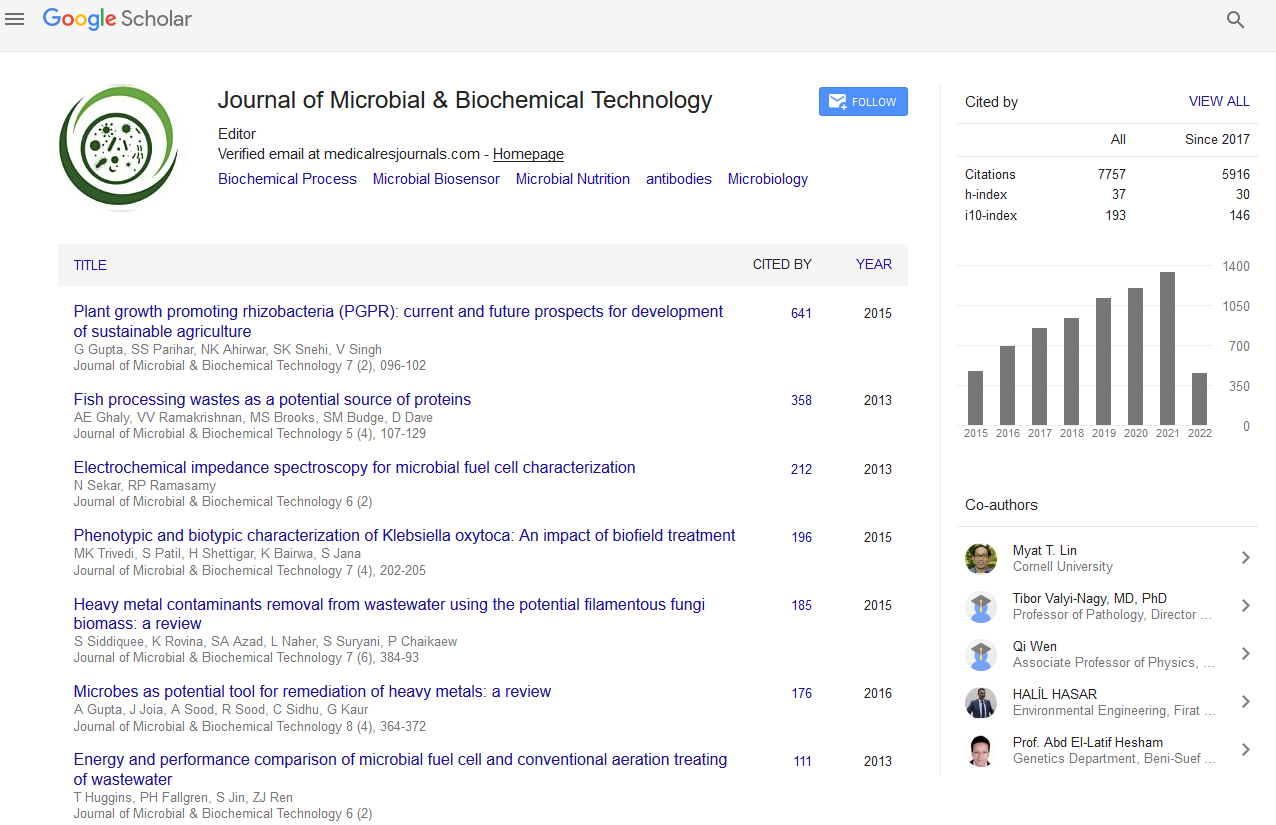PMC/PubMed Indexed Articles
Indexed In
- Academic Journals Database
- Genamics JournalSeek
- Academic Keys
- JournalTOCs
- China National Knowledge Infrastructure (CNKI)
- Scimago
- Access to Global Online Research in Agriculture (AGORA)
- Electronic Journals Library
- RefSeek
- Directory of Research Journal Indexing (DRJI)
- Hamdard University
- EBSCO A-Z
- OCLC- WorldCat
- SWB online catalog
- Virtual Library of Biology (vifabio)
- Publons
- MIAR
- University Grants Commission
- Geneva Foundation for Medical Education and Research
- Euro Pub
- Google Scholar
Useful Links
Share This Page
Journal Flyer

Open Access Journals
- Agri and Aquaculture
- Biochemistry
- Bioinformatics & Systems Biology
- Business & Management
- Chemistry
- Clinical Sciences
- Engineering
- Food & Nutrition
- General Science
- Genetics & Molecular Biology
- Immunology & Microbiology
- Medical Sciences
- Neuroscience & Psychology
- Nursing & Health Care
- Pharmaceutical Sciences
Effects of lactic acid bacteria on intestinal barrier and inflammation in chronic stress-induced mice
Joint Event on 4th World Congress and Expo on Applied Microbiology & 2nd International Conference on Food Microbiology
November 29-December 01, 2017 Madrid, Spain
Yeonjeong Seo and Saehun Kim
Korea University College of Life Science and Biotechnology, Korea
Posters & Accepted Abstracts: J Microb Biochem Technol
Abstract:
Background: The realization that stress alters brain�??gut interaction which is known to play a critical role in health and disease is rapidly advancing. In a stress model, we aimed at evaluating the effect of fermented maillard reaction product treatment on intestinal barrier and inflammation. Moreover, the fermentation of MRP by Lactobacillus rhamnosus 4B15 synergistically enhanced the above effect compared to those of unfermented MRP. Methods: C57BL/6J male mice were administered. In addition, casein, MRP, f-MRP or normal diet-treated mice were also exposed to chronic psychosocial stress, then tight junction protein and inflammatory cytokines are evaluated by H&E staining and q-PCR. Compared to baseline, the mice exposed to chronic mild stress changed intestinal barrier and inflammation response. The f-MRP prevented the increase in intestinal permeability induced by chronic stress and restored tight junction protein such as occludin and ZO-1 expressions to control levels. In addition, expression of inflammatory cytokines was changed compared to baseline. Conclusions: Chronic psychological stress contributes significantly to symptoms of functional bowel disorders and can predispose patients to gastrointestinal infection. Chronic psychological stress can also induce visceral hyperalgesia. In animal models, psychological stress appears to alter gut barrier function. It is conceivable that f-MRP alters gut bacterial communities, preventing intestinal inflammation and impaired permeability induced by chronic stress. These results suggest that glycationinduced modification of casein and fermentation correlated strongly with the enhanced functional properties. And L. rhamnosus 4B15 strain reduces gut barrier disruption and inflammation via a synergistic interplay with the MRP compound and/or metabolites contained in this product. Recent Publications 1. Dabo Xu (2014) Rifaximin alters intestinal bacteria and prevents stress-induced gut inflammation and visceral hyperalgesia in rats. Gastroenterology 146(2):484-496. 2. A Ait-Belgnaoui (2014) Probiotic gut effect prevents the chronic psychological stress-induced brain activity abnormality in mice. Neurogastroenterology and Motility 26(4):510�??520. 3. S Agostini (2012) A marketed fermented dairy product containing Bifidobacterium lactis CNCM I-2494 suppresses gut hypersensitivity and colonic barrier disruption induced by acute stress in rats. Neurogastroenterology and Motility 24(4)376�??e172. 4. Christina L Ohland (2010) Probiotic bacteria and intestinal epithelial barrier function. American Journal of Physiology-Gastrointestinal and Liver Physiology 298(6): G807�??G819. 5. Cristina Delgado-Andrade (2017) Modifications in bacterial groups and short chain fatty acid production in the gut of healthy adult rats after long-term consumption of dietary Maillard reaction products. Food Research International 100:134�??142.
Biography :
Yeonjeong Seo has completed her Bachelor’s degree in Food Engineering from Dongguk University in Korea. Currently, she is pursuing her Master's degree in Food Microbiology at Korea University, and studying probiotics and gut microbiota. Probiotics are live bacteria and yeasts that are good for human’s health, especially digestive system. When people lose good bacteria in the body like after taking antibiotics, for example, probiotics can help replace them. They can help balance good and bad bacteria to keep the body working like it should. She is trying to figure out exactly how probiotics work for human body and diseases.


